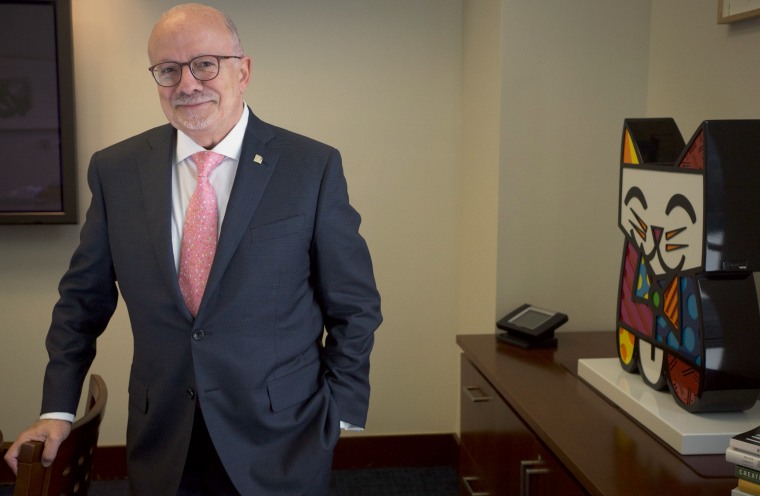This is the first of our series on Latino college presidents around the country.
MIAMI, FL -- Few college presidents understand the challenges Latino students face better than Miami Dade College’s (MDC’s) Eduardo Padrón. After all, he was once a struggling immigrant himself, working two jobs while attending the same college he now presides over.
Padrón, an economist who received his Ph.D. from the University of Florida, is often credited with raising the stature of MDC at a national level since he became president in 1995. It is now the most diverse college in the nation, as its website proudly touts, and it's known as a place where students can receive a high quality education at an affordable price- in essence, making college accessible to all.
“We have worked very hard from the very beginning of this institution to make sure this is a place that welcomes everyone,” Padrón told NBC News during a recent interview.
With over 165,000 enrolled students, MDC is one of the largest higher education institutions in the U.S. Over 70 percent of the students are Hispanic, making it the college or university with the highest number of Latinos in the U.S., according to Padrón. It regularly tops lists of most degrees awarded to Hispanic students. Though it started as a community college, it now also offers Bachelor's Degrees.
Padrón's efforts to make college "accessible for all" have not gone unnoticed; he is widely recognized as a top educational leader. Former President George W. Bush nominated him to the National Institute for Literacy Advisory Board and the National Economic Summit. President Barack Obama appointed him Chairman of the White House Commission on Educational Excellence for Hispanic Americans and he represented the U.S. at UNESCO’s World Conference on Higher Education at the invitation of Obama’s administration. "Time" magazine included Padrón on a list of the 10 best college presidents in 2009. Two years later, The Washington Post named him one of the eight most influential college presidents. Earlier this year, he was inducted into the U.S. News and World Report STEM Hall of Fame. These are just a few of the accolades Padrón has received throughout his career at MDC.
Success did not come easy to Padrón, who arrived in the U.S. as a refugee from Cuba at the age of 15. He said he went through many difficult steps in order to go to school.

“I think it’s an experience that has been very valuable to me in understanding the plight of Latino students,” Padrón said.
Padrón stresses that colleges and universities need to reflect the communities they serve. A large portion of the students at MDC are first generation college students; their families have not had a solid understanding of what college life is all about. But once these students are provided the support they need, Padrón said, “they perform as well or at even higher levels than the average student body.”
Many of the students at MDC have to work full time while going to school. The college has devised flexible programs, which include evening classes as well as Saturday and Sunday classes.
One of the more gratifying moments in his career was to have opened the doors of MDC to undocumented students. He explained the frustration of students who despite being high achievers in high school - in some cases class valedictorians - they have found themselves unable to enroll in college because of their legal status.
MDC allowed undocumented students to enroll, explains Padrón, saying this is why the "DREAMer movement" began at MDC. He emphasized he has had no regrets about the decision. “They [undocumented students] have been some of our best students, the highest achieving students, and the ones who made the best of the opportunity that was given to them.”
Looking at the bigger picture, Padrón says a college education is not only necessary for finding a good job, but to keep the U.S. competitive. He feels the country needs to be able to acquire the skilled workforce that is going to take on the jobs that are being created in society today.
“That is why I feel that an open door is such an important component of what education should be all about today,” Padrón said. A college education, stresses Padrón, should not only be for students who have the resources.
“America needs every one of its citizens to be able to get the kind of education they need so they can contribute to bring about the fruits of progress.”
